Governance and management
Centre Director, Professor Suzanne O’Reilly is supported by a Chief Operating Officer and a Business and Development Officer. Professor O’Reilly provides scientific leadership and strategic direction for the Centre. Node Directors administer the CU and UWA nodes and are responsible for providing leadership in their respective nodes, bringing together researchers to form a coherent team with a shared vision of the whole CoE’s aims and objectives. The Geological Survey of Western Australia has a nominated representative.
Professor O’Reilly chairs an Executive Committee, which guides the Advisory Board, and Centre Director on the appropriateness of the research strategies, reports on progress in achieving aims as well as structure and general operating principles, and identifies and protects the Centre IP. A new Executive position of Centre Research Coordinator was introduced in 2013, taken on by recent MQ appointment Professor Stephen Foley.
The Advisory Board includes senior representatives from industry and other end users such as Geoscience Australia. This model has proven highly productive during the lifetimes of the GEMOC Key Centre and CET. The Board meets annually to provide advice on the research program and governance, and any other matters relevant to CCFS. Two new Advisory Board members (Drs Phil McFadden and Roric Smith) were appointed in 2013, both widening and deepening the outstanding expertise. The six external members of the Advisory Board are very engaged and supportive of CCFS (95% attendance at meetings) and extensively workshopped the new vision statement to reflect the national benefit deriving from the fundamental research in CCFS.
The Science Advisory Committee has a rotating membership and primarily evaluates the Centre’s research, in particular its research strategies, structure and outcomes.
|
Executive Committee |
|
Advisory Board |
| Professor Suzanne Y. O’Reilly - Director Department of Earth and Planetary Science Macquarie University |
Dr Ian Gould Chancellor University of South Australia |
|
| Professor William L. Griffin Department of Earth and Planetary Science Macquarie University |
Dr Andy Barnicoat Chief of Minerals & Natural Hazards Geoscience Australia |
|
| Dr Craig O’Neill Department of Earth and Planetary Science Macquarie University |
Dr Paul Heithersay Deputy Chief Executive, Resources & Energy DMITRE |
|
| Professor Simon Wilde - Node Director Department of Applied Geology Curtin University |
Dr Jon Hronsky Principal Western Mining Services |
|
| Professor Zheng-Xiang Li Department of Applied Geology Curtin University |
Dr Phil McFadden |
|
| Professor Campbell McCuaig - Node Director School of Earth and Environment University of Western Australia |
Dr Roric Smith |
|
| Professor Marco Fiorentini School of Earth and Environment University of Western Australia |
plus the Executive Committee | |
| Dr Ian Tyler (Ex Officio) Assistant Director Geoscience Mapping Geological Survey of Western Australia |
||
| Professor Stephen Foley - Research Coordinator (Ex Officio) Department of Earth and Planetary Science Macquarie University |
||
| Cate Delahunty (Ex Officio) Department of Earth and Planetary Science Macquarie University |
|
Science Advisory Committee |
||
| Professor James Farquhar Earth Systems Science Interdisciplinary Center Department of Geology University of Maryland, USA |
Professor Giorgio Ranalli Department of Earth Sciences Carleton University, Ottawa, Canada |
|
| Professor Michel Gregoire Directeur de Recherche, CNRS, Observatoire Midi-Pyrénées Head of the Laboratory Géosciences, Environnement, Toulouse, France |
Professor Rob van der Voo Geological Sciences University of Michigan, USA |
|
INTERNATIONAL SCIENCE ADVISORY COMMITTEE MEETING 2013
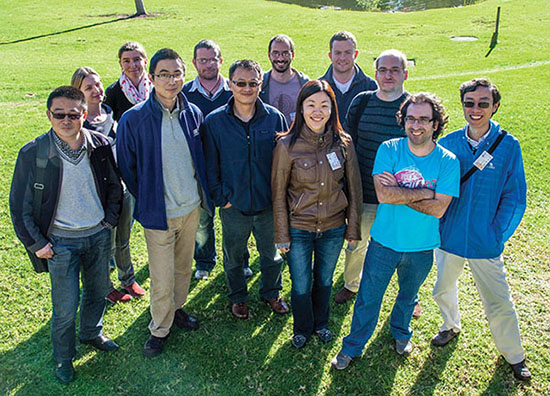
Some of the CCFS early career researchers who presented their research at the SAC meeting; (L-R) Xuan-Ce Wang, Monica Kusiak, Marion Grange, Bin Shan, Chris Clark, Huaiyu Yuan, Yoann Gréau, Takako Satsukawa, Dan Howell, Marek Locmelis, José María González-Jiménez and Siqi Zhang.
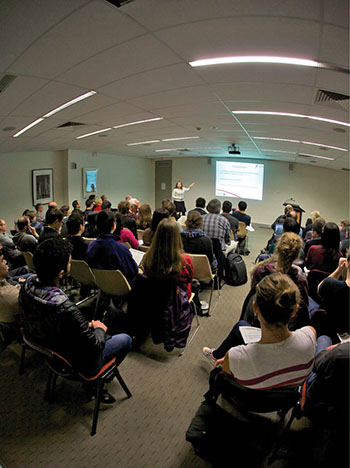
A combined meeting of all CCFS national Collaborating Institutions and the Geological Survey of Western Australia (Partner Institution) was held at Macquarie University on 11-14 June 2013, just 2 years after the Centre officially commenced. Presentations were given by senior to early-career researchers and postgraduate students. The presentations were of outstanding quality, especially those of the postgraduates and early-career researchers. The Science Advisory Committee, James Farquhar, Michel Gregoire, Giorgio Ranalli and Rob van der Voo, presented a comprehensive report praising the Centre structure and activities and providing some very constructive suggestions that are being implemented. Eclectic comments from the Report highlight different aspects of CCFS:
“At the time of the SAC meeting, the reputation of CCFS as a world-class research centre was solidly established, as testified by the very impressive list of publications and conference participations....”
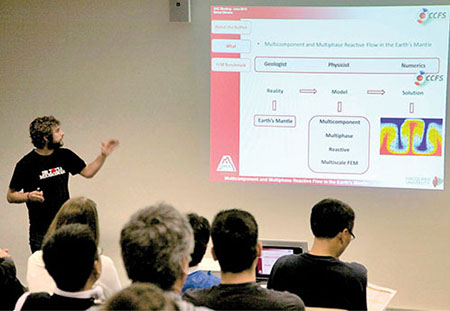
“An important consensus of the SAC was the recognition of significant high-quality contributions by participating early-career CCFS members, postdocs and graduate students, and also an overall enthusiastic attitude about larger questions studied by the CCFS.”
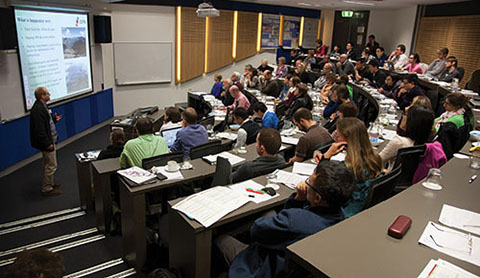
“the SAC recognised the strong integration of research groups and approaches in many of the projects.... This type of interdisciplinary research is not usually accomplished as well by centres that the SAC is aware of other than CCFS.”
“The quality appears.... outstanding. In addition to areas where CCFS is already recognised as a world centre of excellence, other emerging areas were evident.... SAC was particularly impressed by the concentrated effort in geophysical and geodynamic modelling, and by the number and quality of cooperations involving projects in China.”
“With respect to geophysics/geodynamics, two things stand out: the extremely rapid development of this field within CCFS, and the determined attempt to develop a numerical modelling platform for integrated use in combination with geochemical, geological and petrological data.”
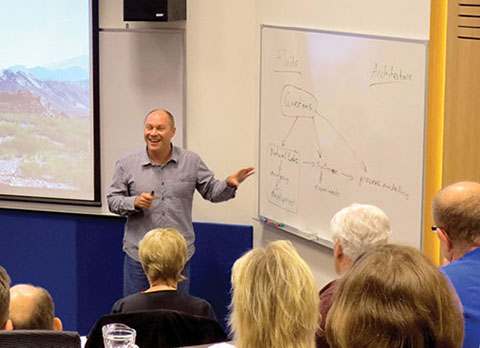
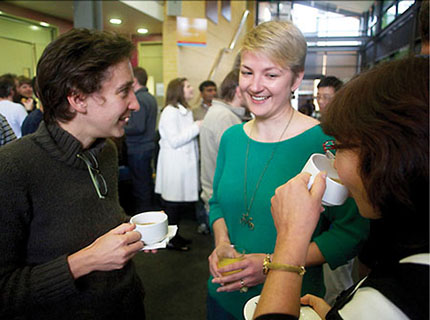
“The group at Macquarie University contributes world-class microanalytical ICP-MS capabilities. The groups at UWA and Curtin University contribute world-class microanalytical secondary ion mass spectrometry capabilities which in many cases are world leading ....integration of these techniques with numerical modelling, geophysics, petrography and ore deposit research promises transformational insights into fluid systems. The CCFS provides a direct way to integrate these techniques into some of the most important questions facing earth science today.”
“In addition, SAC thinks that the integration of fundamental research, strategic research – including cooperation with the mineral resources industry – and technology development represents a fundamental aspect of CCFS’ mission and development. This is reflected by the “Whole of Centre” projects.”
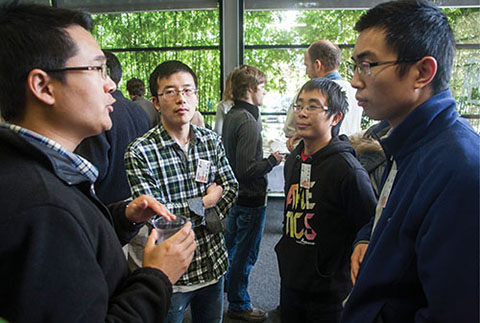
“CCFS brings together several areas of expertise that are world-class, and the combination makes it world leading. These include the core of GEMOC which is now part of the CCFS expertise in mantle fluid sources and transport in time and space, expertise related to Earth’s early environments, analytical expertise and facilities (also noted above), expertise and numerical geodynamic modelling and geophysical imagery, and finally, connections to economic geology and industry.”

 ARC Centre of Excellence for Core to Crust Fluid Systems
ARC Centre of Excellence for Core to Crust Fluid Systems